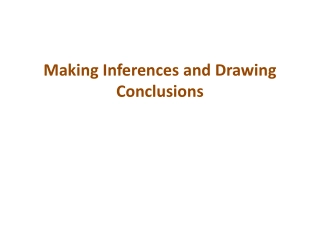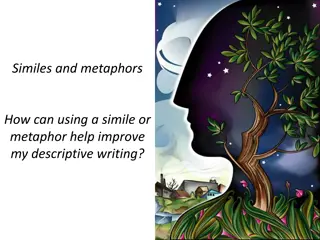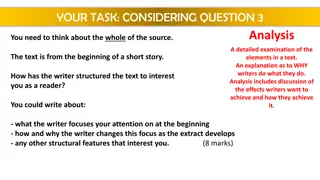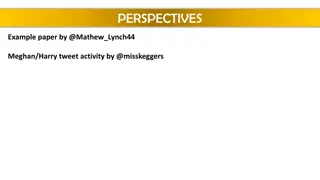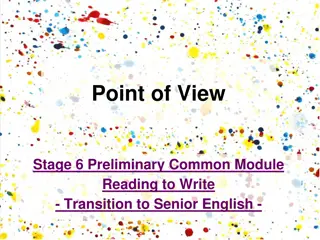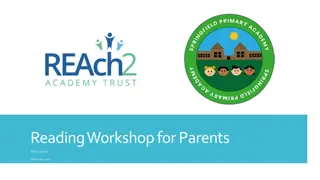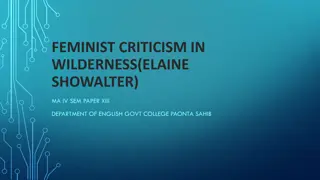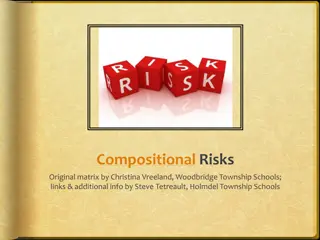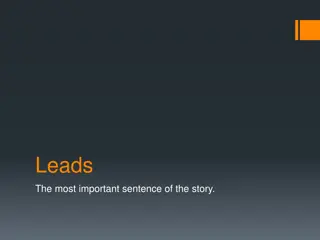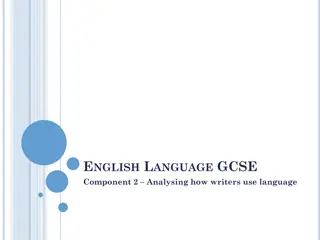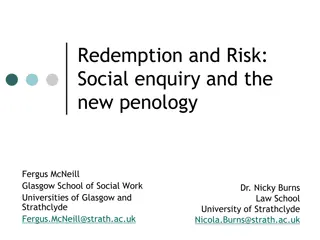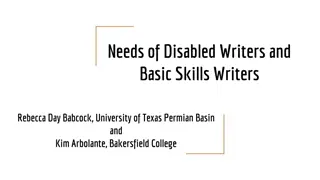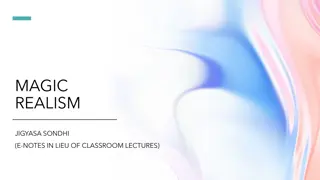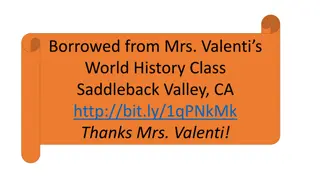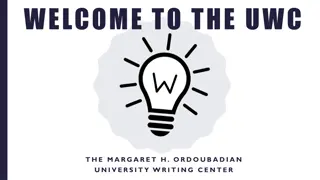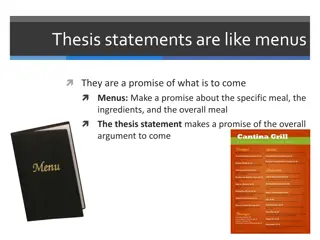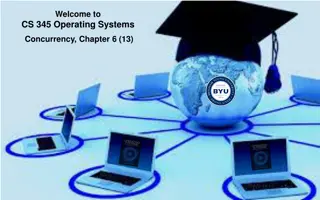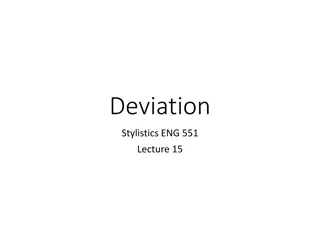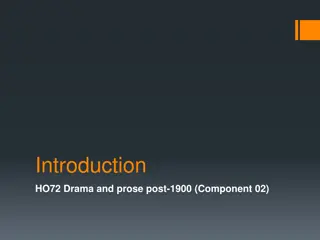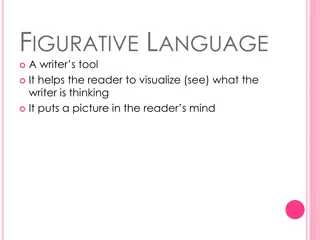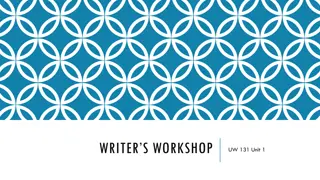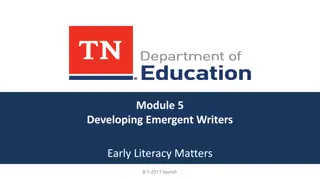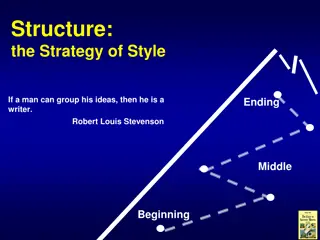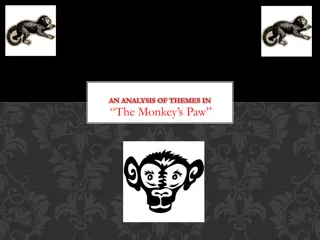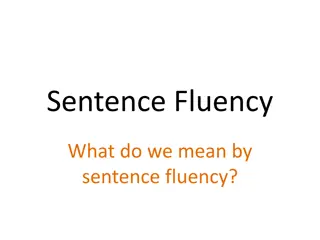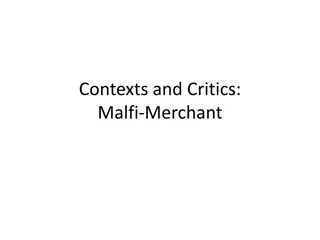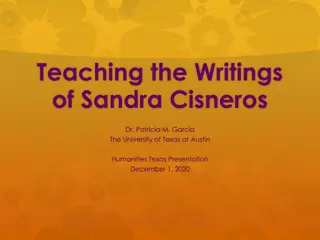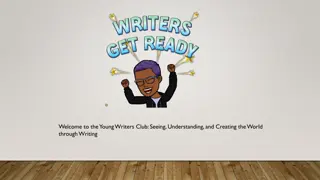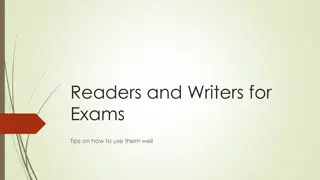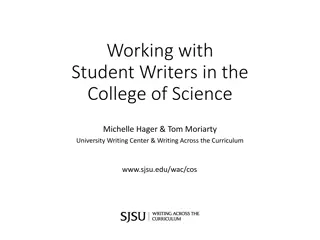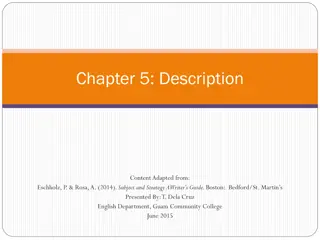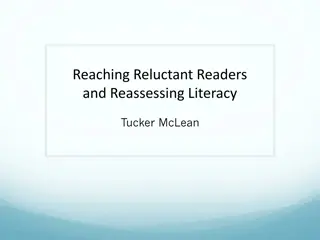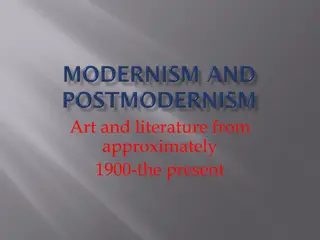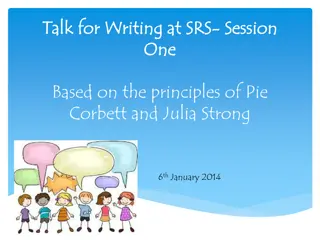Making Inferences and Drawing Conclusions
Readers construct meaning by inferring unstated meanings based on social conventions, shared experience, and shared values. Inferences are evidence-based guesses drawn from what is actually said, enabling readers to understand implications and draw conclusions. Tips for reading include relying on th
0 views • 10 slides
OPEN LETTER Heidi Camacho.
Open letters serve as a powerful means of communication, reaching a wide audience while addressing specific individuals or entities. These public letters aim to spark discussion, advocate for change, or shed light on social issues. By maintaining a direct and persuasive tone, open letters engage rea
0 views • 5 slides
Enhancing Descriptive Writing with Similes and Metaphors
Using similes and metaphors can greatly enhance descriptive writing by creating vivid imagery and engaging comparisons. This interactive content explores the definition of similes and metaphors, provides examples, and encourages practice through exercises related to the sun, rain, wind, and more. It
0 views • 6 slides
Understanding Text Structure for Analysis
This content provides guidance on analyzing text structure in a literary extract. It explores how writers manipulate elements like setting, time, characters, tone, atmosphere, and dialogue to engage readers. The structured approach helps readers understand and evaluate the impact of these choices on
0 views • 25 slides
Analyzing Perspectives: Writers' Thoughts and Emotions
Delve into the perspectives of writers showcased in an example paper by Mathew Lynch and Meghan/Harry tweet activity by misskeggers. Explore questions on the writers' thoughts, feelings, imaginings, and experiences, and understand how they convey their perspectives through various methods and tones.
0 views • 20 slides
Understanding Point of View in Literature: A Comprehensive Guide
Explore the concept of point of view in literature, which refers to the perspective from which a story is told. Learn how writers use different points of view to shape the narrative and engage readers. Dive into examples from classic works and analyze the impact of first person, second person, and t
1 views • 9 slides
Effective Strategies for Parental Involvement in Children's Reading Development
Explore how children are taught to read and develop into confident readers in the Reading Workshop for Parents led by Miss Gibson in February 2023. Discover useful strategies to support your child at home, enhance word recognition, comprehension, and fluency, and foster a love for reading. Delve int
0 views • 19 slides
Feminist Criticism in the Wilderness by Elaine Showalter - Analysis
Elaine Showalter's essay "Feminist Criticism in the Wilderness" delves into the realm of feminist literary critique, addressing the diversity among women writers and emphasizing the importance of considering factors beyond gender. Showalter highlights the challenges and goals of feminist criticism w
0 views • 13 slides
Exploring Writers' Viewpoints Through Music Texts
Dive into a lesson on evaluating writers' viewpoints and perspectives using music texts like Katy Perry's "Chained to the Rhythm." Understand the techniques writers use to convey their ideas and messages, and apply evaluation skills to analyze lyrics effectively.
0 views • 12 slides
Understanding Compositional Risks in Writing
Explore the concept of compositional risk in writing, where authors strive to create engaging and unique content. Learn about the risks writers take to captivate readers, from using voice, repetition, and figurative language to incorporating humor, sarcasm, and surprise elements. Discover how quirki
2 views • 24 slides
Crafting Compelling Leads in Writing: The Art of Snagging Readers
Attracting readers is a skillful craft in writing. The key lies in creating compelling leads that hook readers from the start. Learn the importance of snagging readers, the art of building a lead, and techniques such as humor and curiosity to captivate your audience effectively.
0 views • 21 slides
Understanding Figurative Language: A Guide to Metaphors, Similes, and More
Figurative language is a powerful tool used by writers to evoke emotions and create vivid imagery in the minds of readers. It goes beyond literal meanings, allowing for deeper interpretations and connections with the subject matter. This guide explains the difference between figurative and literal l
0 views • 40 slides
Analyzing Writer's Language Use in English Language GCSE Component 2
In English Language GCSE Component 2, students learn to analyze how writers use language. The learning objective focuses on commenting, explaining, and analyzing language use with relevant subject terminology. The exam assesses students on their ability to interpret and explain a writer's thoughts,
0 views • 12 slides
Redemption and Risk: Social Enquiry and the New Penology
Social enquiry explores transitions from old to new penology, emphasizing risk management over treatment and responsibilization over mitigation. Probation officers act as storytellers shaping perceptions in the criminal justice system, prompting humane responses and social explanations. Research del
2 views • 20 slides
Understanding the Needs of Disabled and Basic Skills Writers in Writing Centers
Explore the challenges and strategies related to disability, basic skills development, and access barriers faced by writers in educational institutions. Learn about evidence-based practices and developmental models to support diverse writers in improving their writing skills.
0 views • 13 slides
Understanding Reference and Inference in Linguistics
Discussing deixis, the act of reference in language is explained as a way for speakers and writers to enable listeners and readers to identify entities. Reference involves using proper nouns, phrases, pronouns, and even invented names. Inference plays a crucial role in successful acts of reference,
0 views • 11 slides
Understanding Screen Readers and Their Importance in Web Accessibility
Screen readers are crucial software tools that convert digital content into speech or Braille for individuals with visual or cognitive impairments. This article explores the usage of screen readers, recommended software, mobile options, customization settings, navigation shortcuts, skip links, and m
0 views • 11 slides
Exploring Magic Realism in Literature
Magic Realism is an artistic genre that blends magical elements with realistic settings, intertwining external and internal realities. Popularized by writers like Marquez and Borges, it challenges traditional narrative structures and blurs boundaries between the real and the fantastical. This genre
0 views • 9 slides
Italian Renaissance: Writers and Artists Spotlight
Italian writers like Dante Alighieri and Niccolo Machiavelli made significant literary contributions during the Renaissance period. Dante's iconic work, "The Divine Comedy," showcased societal issues, while Machiavelli's "The Prince" offered political advice emphasizing practicality over theory. Ita
0 views • 22 slides
UWC Margaret H. Ordoubadian University Writing Center Information
The UWC Margaret H. Ordoubadian University Writing Center provides a range of services to help writers at all stages of the writing process. Located in Walker Library, the center offers assistance with brainstorming, drafting, revising, and understanding assignments. Writers can bring various projec
0 views • 13 slides
Crafting Compelling Introductions: A Writer's Guide
Crafting a captivating introduction is like preparing a delicious meal that entices readers to stay engaged. Just like menus and free samples lure diners, introductions hook readers with a promise of what's to come. This guide explores the analogy between introductions and food samples, providing ti
0 views • 16 slides
Mastering Concurrency in Operating Systems: Tips and Strategies
Explore intricate concepts in operating systems concurrency from Chapter 6 of CS 345. Learn practical tips and techniques such as determining the size of arrays, managing readers and writers using semaphores, and tackling the Barbershop Problem. Dive into array manipulation, semaphore usage, and pri
0 views • 37 slides
The Significance of Deviation in Literature
Linguistic deviation in literature serves to disrupt the normal processes of communication, challenging readers with non-traditional expressions and interpretations. Writers use deviation to create unique aesthetic value in their works, prompting readers to delve deeper into unfamiliar compositions
0 views • 12 slides
Study of Modern Drama and Prose Post-1900
This component focuses on the study of a modern play (The History Boys) and a modern prose text (The Great Gatsby). Learners explore cultural and contextual influences on writers and readers, analyze literary texts, demonstrate understanding of contexts, and make connections across texts. The examin
0 views • 23 slides
Understanding Figurative Language in Writing
Figurative language is a powerful tool that writers use to enhance their work by creating vivid images in the reader's mind. This includes techniques such as similes, puns, oxymorons, allusions, foreshadowing, and paradoxes, each serving a unique purpose in conveying deeper meanings and engaging the
0 views • 27 slides
Mastering the Art of Writing Engaging Leads and Captivating Readers
Crafting a captivating lead is essential in journalism to entice readers into exploring a story further. This involves using techniques such as compelling photographs, intriguing headlines, and engaging first lines to hook readers from the start. By understanding the importance of strong beginnings
0 views • 36 slides
Comprehensive Overview of Writers Workshop Practices and Protocols
Explore the essential elements of Writers Workshop in educational settings, including course introductions, collaborative revision approaches, tuning protocols, and student feedback mechanisms. Learn about effective strategies, outcomes, and lessons learned to enhance the workshop experience for wri
0 views • 7 slides
Developing Emergent Writers: Module 5 Overview
Module 5 focuses on developing emergent writing skills in children through activities that enhance fine motor skills, hand-eye coordination, and left-to-right directionality. Teachers play a crucial role in modeling purposeful writing and providing opportunities for children to experiment with writi
0 views • 11 slides
Mastering the Art of Document Organization
Effective document structure is crucial for engaging readers and conveying information clearly. This includes organizing content into a beginning, middle, and ending, crafting strong titles, and utilizing summaries to prepare readers for the main body of work. By following these strategies outlined
0 views • 22 slides
Exploring Themes in Literature: Insights and Examples
Themes in literature encompass central ideas that provide insight into universal human experiences. Writers convey their perspectives on topics like love, power, survival, good vs. evil, and more, examining how these themes relate to life and human nature. Through close analysis, readers can uncover
0 views • 12 slides
Understanding Sentence Fluency in Writing
Sentence fluency in writing refers to the graceful, varied, and rhythmic flow of sentences that are easy to read aloud and well-structured. It involves logical and creative phrasing, parallel construction, and attention to word order. Mem Fox emphasizes the importance of beautifully crafted sentence
0 views • 25 slides
Influential Writers: Chaucer and Webster in English Literature
Chaucer, born in mid-14th century London, was influenced by French and Italian poets, creating impactful works like "The Canterbury Tales." On the other hand, Webster, born in 1580, crafted dark revenge tragedies like "The Duchess of Malfi," reflecting the troubled mood of his time. Both writers lef
0 views • 7 slides
Exploring the Writings of Sandra Cisneros
Sandra Cisneros, a renowned novelist, poet, teacher, and philanthropist, has made significant contributions to literature. Her works, including "The House on Mango Street" and "Woman Hollering Creek and Other Stories," delve into cultural identity and personal connections. Through her writing, Cisne
0 views • 19 slides
Exploring the World of Young Writers Club: Writing, Creativity, and Perspective
Delve into the realm of writing with the Young Writers Club, where members immerse themselves in the art of expression, exploring diverse perspectives through words. From quick writes to creating poems using six words, participants engage in thought-provoking activities and gain insights into the po
0 views • 17 slides
Effective Strategies for Using Readers and Writers in Exams
Learn how readers and writers can assist you during exams by decoding text, reading instructions, and more. Discover what they can and cannot do, as well as useful phrases to communicate effectively with them. Explore the benefits of having a scribe for expressing thoughts quickly and effortlessly i
0 views • 10 slides
Enhancing Student Writers' Skills in Science Disciplines
Student writers in the College of Science may struggle with transferring writing skills to new contexts. This article explores why writers forget and provides strategies for teachers to assist students in mastering unique writing genres within science disciplines.
0 views • 25 slides
Mastering Description in Writing
Effective description in writing is crucial for creating vivid images, establishing mood, and conveying a dominant impression. By using specific nouns and action verbs, writers can make their descriptions lively and engaging. The goal is to move from general to specific details, painting a clear pic
0 views • 17 slides
Understanding and Supporting Reluctant Readers in Literacy Education
Reluctant readers are a diverse group with various reasons for their reluctance. Strategies to engage and support struggling readers include creating a safe and supportive environment, interrupting negative thinking cycles with small successes, and providing high-interest, low-vocabulary nonfiction
0 views • 34 slides
Exploring Art and Literature from 1900 to the Present
Novels, plays, and poetry saw a resurgence post-Whitman and Dickinson, with writers experimenting with unique styles like interior monologue and stream of consciousness. Characters chased the American dream, expressing admiration for America as a land of opportunity. The Modernism movement reflected
0 views • 13 slides
Enhancing Writing Skills Through Talk for Writing Approach
Discover the key principles of Talk for Writing, understand the importance of Shared Writing, and explore how to improve the teaching and learning of writing in your classroom. Learn about the challenges children face in writing compared to reading and how Talk for Writing can help externalize the i
0 views • 27 slides
